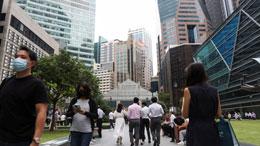Asia dangles visas for skilled workers

From Singapore to Thailand to Taiwan, a competition is heating up in Asia as the global race for skilled workers intensifies.
In Singapore for instance, the latest data released on Sept. 27, shows the population rebounded by 3.4% to 5.63 million, largely driven by workers in sectors like construction and shipyards -- the unsung labour that keeps the economy going.
Now, Singapore hopes to attract more highly skilled professionals with expertise and ideas that could jolt growth in the post-COVID era. "This is an age where talent makes all the difference to a nation's success," Prime Minister Lee Hsien Loong said in his annual National Day Rally speech on Aug. 21, days before his government announced a new type of visa designed to lure such people. "We need to focus on attracting and retaining top talent, in the same way, we focus on attracting and retaining investments."
The city-state is far from the only place that covets high-flyers. From Thailand to Taiwan, competition is heating up to entice the best of the best, and to fill hiring gaps with people equipped to excel in today's pandemic-altered workplace.
Innovative sectors like digital technology and biotechnology are especially hungry for talent.
Singapore's latest carrot is called the Overseas Networks and Expertise (ONE) Pass, a new visa for high-skill professionals who earn at least 30,000 Singapore dollars ($20,800) a month. The program will allow people with these visas to stay at least five years and work at multiple organizations.
Thailand, meanwhile, began taking applications on Sept. 1 for a new visa that lets global professionals stay in the country for 10 years. The government hopes to bring in 1 million foreign nationals with the Long-Term Resident (LTR) visa, designed for those with skills in targeted sectors such as electric vehicles, biotechnology and defense.
Tourism-oriented Thailand, like Singapore, has been hit hard by travel disruptions. Both also have aging populations. While Singapore is expecting growth in the 3% to 4% range this year, the Asian Development Bank's latest outlook forecasts Thailand's growth rate at 2.9%, far below Indonesia's expected growth of 5.4%, Malaysia's 6% and Vietnam's 6.5%.
Malaysia, for its part, aims to attract wealthy investors with its new Premium Visa Program. The program, which began accepting applications on Saturday, allows people who can deposit 1 million ringgit (about $215,000) in the country and have an annual offshore income of around $100,000 to stay for up to 20 years. During that time, they can invest, run businesses and work.
As part of a broader move to bring in more human resources, Australia recently raised its annual permanent immigration cap to 195,000 for the current fiscal year, from 160,000.
These initiatives add to existing programs offered around the region, such as Taiwan's Employment Gold Card system, which started in 2018 for foreign professionals in targeted sectors such as science and technology.
"Despite recession fears, many companies are backfilling from the pandemic and hiring for new roles as part of their expansion plans that they have put a pause on for the past two years," said Jaya Dass, managing director of permanent recruitment for the Asia-Pacific region at Randstad, a staffing company.
Dass noted that the evolution of business and digital transformation over the past two years has created a need for professionals armed with new skills. "There is now a greater focus on high-value jobs. Besides being digitally adept, employers are looking for talent who are agile, innovative and able to think critically," Dass said.
Finding that talent appears increasingly difficult. A survey by ManpowerGroup, another human resources company, found that 75% of about 40,000 companies globally reported challenges in hiring the employees they need, a big jump from 54% in 2019.
Companies in some Asian economies are struggling more than the global average: 88% of Taiwanese employers reported such challenges, the highest among the 40 economies the survey covered. Singapore employers did not fare much better, at 84%.
Government leaders share a sense of crisis about the competition for talent.
"Right now, the best and the brightest minds aren't coming to Australia. They're going elsewhere," Canberra's Home Affairs Minister Clare O'Neil said, announcing the immigration revision on Sept. 2. "If we want Australia to continue to thrive, then we are going to need more help."
Japan is rushing to catch up with other Asian nations, planning to expand its own programs for high-skill foreign workers.
Japanese Prime Minister Fumio Kishida, pictured during remarks on Sept. 17, has acknowledged that Japan is "lagging" behind when it comes to competing for human resources.
"We are now entering an era of global competition for human resources, in which countries around the world are competing to attract the best foreign talent," Prime Minister Fumio Kishida told reporters on Sept. 17. Pointing to Singapore as well as New Zealand as another country with preferential visa programs. "Japan is still lagging in this area, and we must make more efforts," he acknowledged.
Businesses seem to appreciate such endeavours.
Singapore's new ONE Pass has already drawn significant attention and rave reviews.
Kei Shibata, a Japanese entrepreneur who runs a travel startup in Singapore, said he was interested in the new visa, as it offers a longer stay than existing programs and allows holders to work in multiple companies.
"In terms of setting up and growing a business here, it would be nice to have a visa for about five years," he told Nikkei Asia. He also noted that some entrepreneurs serve as outside directors of other companies, saying he thinks there is a need for the program. Nikkei






